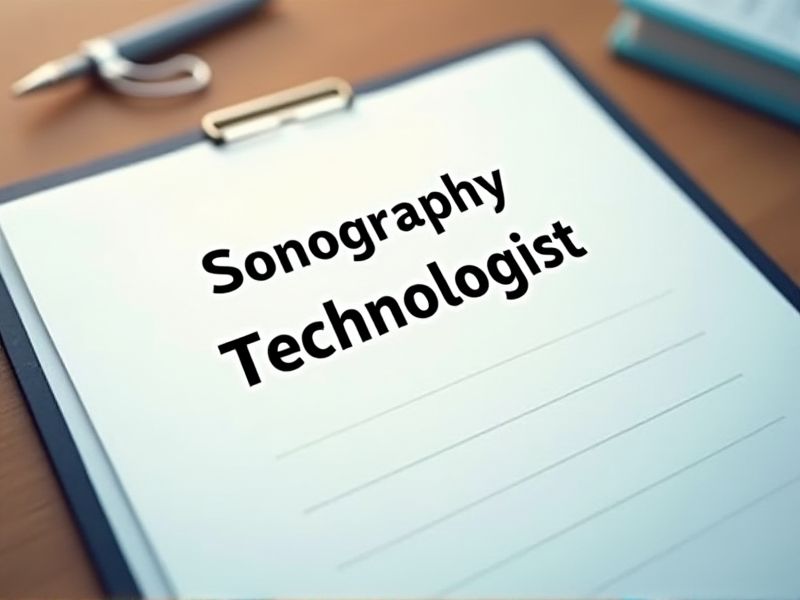
Sonography Technologists play a crucial role in medical diagnostics by utilizing specialized ultrasound equipment to capture images of patients' internal organs. To ensure accurate and safe procedures, they must possess a deep understanding of both the technology and the human anatomy. Earning specific certifications demonstrates their competence, adherence to industry standards, and commitment to professional development. Below are key certifications essential for a career as a Sonography Technologist.
Registered Diagnostic Medical Sonographer (RDMS)
The Registered Diagnostic Medical Sonographer (RDMS) credential is required for sonography technologists to ensure rigorous standards of practice and patient safety. Certification validates the technologist's knowledge and skills, meeting industry standards crucial for accurate diagnostic imaging. Hospitals and clinics seek RDMS-certified professionals to enhance reliability and trust in medical diagnostics. Credentialing often leads to better career advancement and job opportunities for sonography technologists.
Registered Diagnostic Cardiac Sonographer (RDCS)
Having a Registered Diagnostic Cardiac Sonographer (RDCS) ensures a standardized level of competency in performing cardiac imaging procedures. This certification builds trust and confidence among patients and healthcare providers regarding the accuracy of diagnostic results. RDCS credential indicates a sonographer's commitment to professional development and adherence to best practices in cardiac sonography. Facilities employing RDCS-certified technologists may experience improved diagnostic outcomes and patient care efficiency.
Registered Vascular Specialist (RVS)
Registered Vascular Specialists (RVS) enhance the accuracy of vascular ultrasound diagnostics by providing specialized knowledge in vascular systems. Their expertise reduces the potential for diagnostic errors, improving patient outcomes in the diagnosis and management of vascular diseases. The presence of RVS-certified technologists supports adherence to industry standards and protocols, elevating the quality of sonographic services. Having RVS professionals ensures comprehensive training and skill in handling complex vascular imaging cases.
Registered Musculoskeletal Sonographer (RMSK)
The credential of a Registered Musculoskeletal Sonographer (RMSK) validates a technologist's expertise in musculoskeletal ultrasound, leading to increased diagnostic accuracy. Sonography technologists with RMSK certification are often more trusted by both physicians and patients, enhancing the overall credibility of sonographic evaluations. Possessing the RMSK credential allows technologists to differentiate themselves in a competitive job market, providing a distinct professional advantage. Advanced certification like the RMSK often results in greater career progression opportunities and potential salary increases for sonography technologists.
Basic Life Support (BLS) Certification
Sonography technologists often work in healthcare settings where medical emergencies can occur, necessitating preparedness and immediate response. Acquiring Basic Life Support (BLS) certification equips them with essential skills to perform CPR and handle urgent cardiac and respiratory situations effectively. The certification ensures compliance with healthcare industry standards, as many employers require BLS competencies as part of their hiring criteria. Enhanced capability in emergency scenarios fosters a safer environment for both patients and healthcare professionals, which aligns with the overall goal of improving patient outcomes.
Advanced Cardiovascular Life Support (ACLS) Certification
Sonography technologists often work in settings where patients may experience sudden cardiac events, necessitating immediate ACLS intervention to stabilize their condition. Certification in ACLS equips sonographers with the skills to recognize and manage patients experiencing cardiovascular emergencies, potentially improving patient outcomes. Hospitals and healthcare facilities prefer staff with ACLS training to ensure comprehensive emergency preparedness. Incorporating ACLS-certified sonography technologists into a team can enhance the overall response capability during critical situations.
Pediatric Advanced Life Support (PALS) Certification
Sonography technologists often interact with pediatric patients, and possessing Pediatric Advanced Life Support (PALS) Certification equips them to respond to life-threatening emergencies. Emergencies can occur unexpectedly during imaging procedures, and having PALS certification enables quick, effective action to stabilize a child. Knowledge of PALS protocols ensures sonographers can support medical teams during pediatric resuscitation efforts. Hospitals and clinics prioritize patient safety, making PALS certification increasingly vital for roles that involve direct patient interaction.
Ultrasound Infection Control Certification
Sonography technologists handle ultrasound equipment that can harbor infectious agents if not properly cleaned. Infection control certification ensures they are trained in sterilization techniques, reducing the risk of cross-contamination between patients. Hospitals and clinics require certified technologists to comply with health regulations and maintain accreditation standards. By achieving certification, technologists demonstrate their commitment to patient safety and professional competency.
HIPAA Compliance Certification
HIPAA compliance certification is crucial for sonography technologists because it ensures patient information remains secure and confidential during imaging procedures. With strict adherence to HIPAA guidelines, technologists reduce the risk of unauthorized data breaches, which can have legal and financial repercussions. Understanding HIPAA regulations enables them to handle sensitive information professionally, fostering trust among patients. Certification signifies a commitment to ethical standards, enhancing the technologist's credibility within healthcare environments.
Quality and Performance Improvement Certification
The evolving landscape of healthcare demands that sonography technologists continuously enhance their skills and knowledge to ensure the highest standards of patient care. Quality and Performance Improvement Certification equips technologists with advanced techniques and best practices that directly improve diagnostic accuracy. Healthcare institutions increasingly prioritize certified professionals, which directly influences hiring decisions and career advancement opportunities for sonographers. The certification fosters a culture of accountability and continuous improvement within the field, greatly benefiting both patients and healthcare providers.
Summary
When you obtain certifications as a Sonography Technologist, your employability significantly increases. Employers often prioritize candidates with certified credentials, recognizing your dedication to professional development. Salaries generally rise as a direct outcome of specialized skills and expertise. Certifications can grant you access to advanced roles and responsibilities within healthcare settings.
